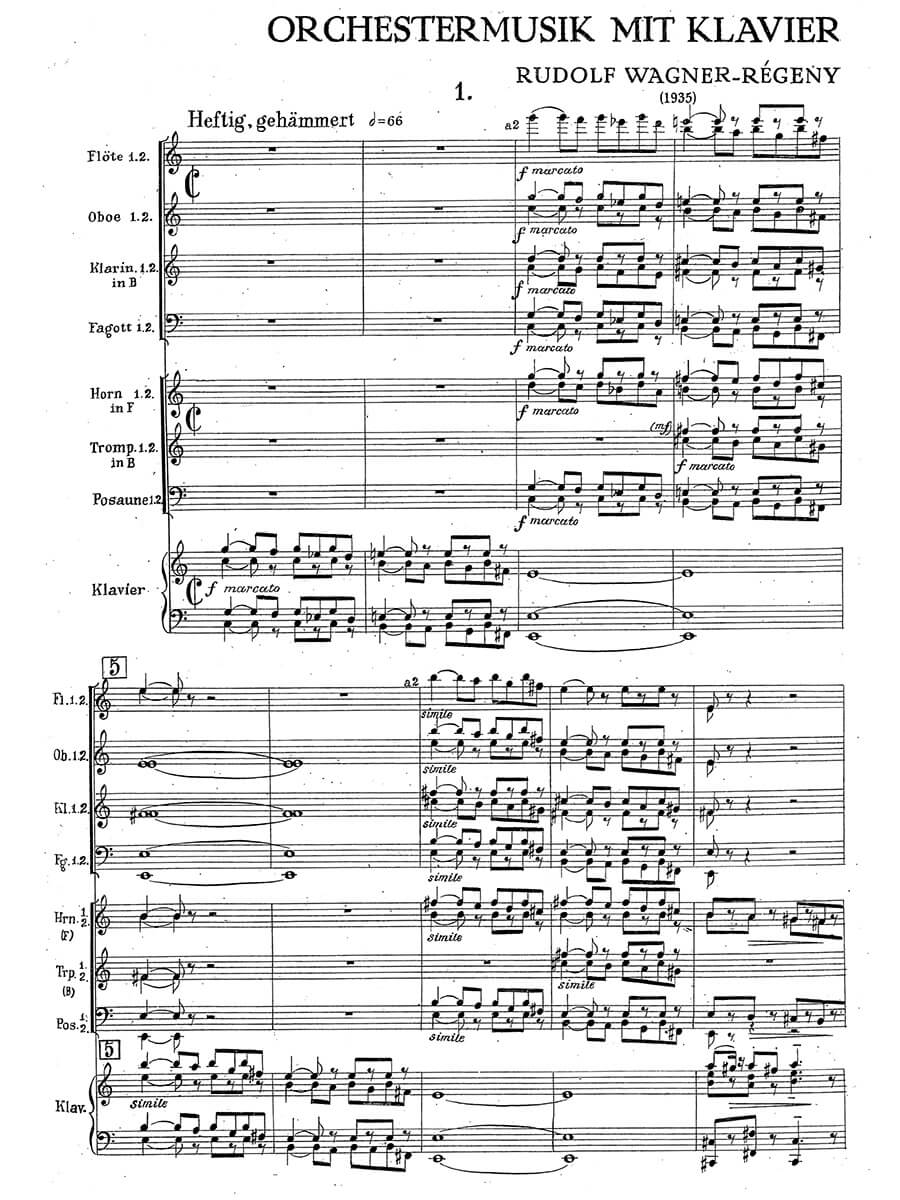Orchestermusik mit Klavier
Wagner-Régeny, Rudolf
29,00 €
Rudolf Wagner-Régeny – Orchestermusik mit Klavier (Orchestral Music with Piano, 1935)
(b. Sächsisch-Regen [Reghin, Szászrégen], 28 August 1903 – d. East Berlin, 18 September 1969)
I Heftig, gehämmert ([Vehement, hammering] p. 1)
II Einfach, zart ([Simple, tender] p. 42)
IIIa Freimütig, frisch ([Frank, fresh] p. 48) –
IIIb Anmutig bewegt ([Moving gracefully] p. 68)
Preface
Born and raised in Transylvania (Austria-Hungary), Rudolf Wagner-Régeny proved early on to be an exceptional musical talent and, in particular, an excellent pianist. Hungarian by birth, he became a Romanian citizen from 1919. In 1919, after the breakup of Austria-Hungary, he began his studies at the Leipzig Conservatory (with Robert Teichmüller, the fugue specialist Stephan Krehl, and Otto Lohse), which he continued in 1920-23 at the Charlottenburg Musikhochschule in Berlin with Franz Schreker, Emil Nikolaus von Reznicek, Siegfried Ochs, Rudolf Krasselt, and Friedrich Ernst Koch. In 1923-25 he was répétiteur at the Berlin Volksoper, and in 1926-29 composer and conductor of Rudolf von Laban’s touring ballet company. In 1930 Wagner-Régeny became a German citizen and now worked as a freelance composer and musical mentor in Berlin. He started collaborating with the legendary stage designer and librettist Caspar Neher (1897-1962) in 1929, and, after four early works in 1928-30, quickly became one of Germany’s most successful opera composers with ‘Der Günstling oder die letzten Tage des großen Herrn Fabiano’[The Favourite or The Last Days of the Great Gentleman Fabiano], based on Caspar Neher’s libretto after Georg Büchner’s translation of Victor Hugo’s ‘Maria Tudor’ (premiered in 1935 at the Dresden Semperoper under Karl Böhm and performed in about 100 opera houses until 1942). 100 opera houses), ‘Die Bürger von Calais’ [The Citizens of Calais] on Caspar Neher’s libretto after Jean Froissart’s medieval “Chronique de France” (premiered in 1939 at the Berlin State Opera under Herbert von Karajan), ‘Johanna Balk’ on Caspar Neher’s libretto after a transylvanian chronicle (premiered in 1941 at the Vienna State Opera under Leopold Ludwig) and, after World War II, the ‘Persian Episode (The Bowel Launderer)’, based on Caspar Neher’s libretto and incorporating poems by Bertolt Brecht (composed in 1950, first performed in 1963 at the Volkstheater Rostock under Gerd Puls), the scenic oratorio ‘Prometheus’ on his own libretto after Aeschylus and Goethe (premiered in 1959 for the opening of the new opera house at the Staatstheater Kassel under Paul Schmitz), and – this being his final great success – ‘Das Bergwerk zu Falun’ [The Falun Mine] on his own libretto after Hugo von Hofmannsthal (premiered in 1961 at the Salzburg Festival under Heinz Wallberg). …
Read full preface > HERE
| Score No. | |
|---|---|
| Edition | |
| Genre | |
| Size | |
| Printing | |
| Pages |
